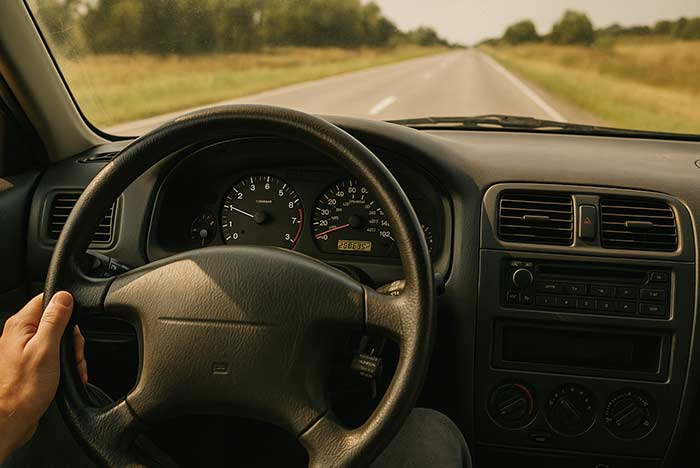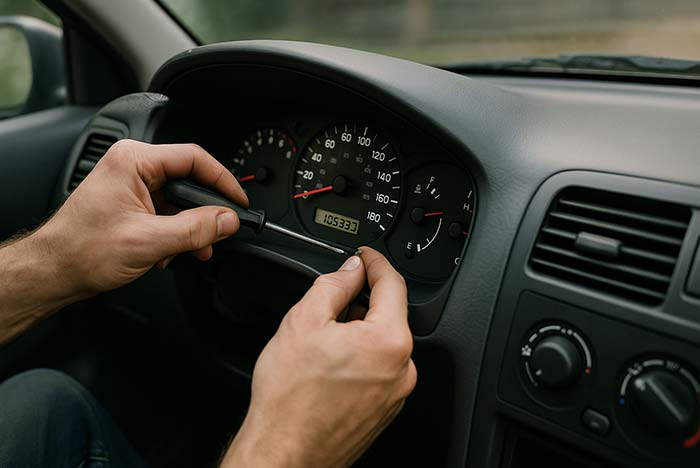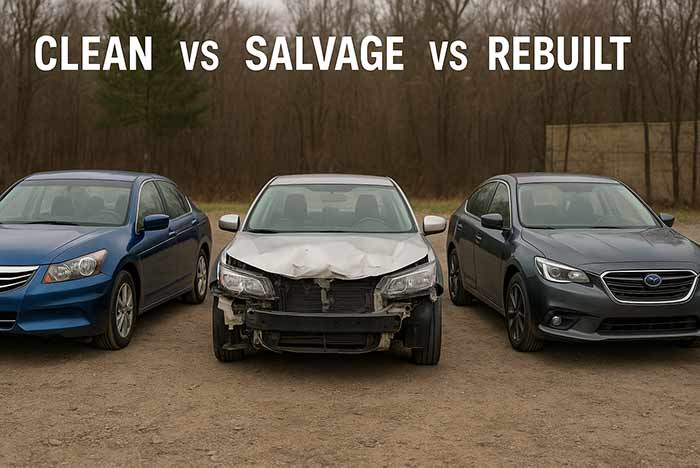
Clean vs. Salvage vs. Rebuilt Title – What They Mean & What to Watch For
Clean vs. Salvage vs. Rebuilt Title – What They Mean & What to Watch For
The title of a vehicle tells you more than just who owns it. Iw shows the car’s legal status and history. If it is clean, salvaged, or rebuilt. The title can reveal if the car has been restored after a major accident, flooded or it had a major wreck.
What exactly does a rebuilt title mean? And what does a salvage title mean? These terms often scare buyers — sometimes for good reason. But they can also offer deals if you know what to look for.
A clean title usually means the car has a solid past with no big red flags. But if the car was badly damaged and claimed as a total loss by an insurer, then it gets a salvage title. Later the same car can be fixed and passes all inspections, then it earns a rebuilt title.
Understanding these differences matters. You could overpay for a risky car — or skip a deal just because the title sounds scary. In this article, we’ll break down each type of title, how to spot them, and what to watch out for. Whether you’re buying, selling, or just curious, this will help you make smarter choices.
What Does a Clean Title Mean?
If the car has a clean title, it means that it has never been declared by an insurance company as a total loss. The car was never in a major accident, flood, fire, or theft incident that would require it to be written off. This is the status most buyers want because it signals a clear, trouble-free history.
Why Clean Title is Important
A clean title is a sign of trust. That is a sign that the vehicle hasn’t been through serious damage that could affect safety, performance, or resale value. Vehicles with clean titles are easier to finance, insure and resell.
What It Doesn’t Mean
Clean doesn’t mean perfect. A car can have a clean title and still have damage, just not enough for the insurance company to total it. That’s why getting a pre-purchase inspection is still smart, even if the title is clean.
How Do You Know If a Car Has a Clean Title?
You can check in a few ways:
- Ask to see the title document — It will say “Clean” or show no salvage branding.
- Use a VIN check service like ProVinCheck
- Check with your local DMV — They can verify the status in their records.
Why Buyers Prefer It
Cars with clean titles:
- Hold their value better.
- Are easier to register and insure.
- Raise fewer red flags during resale.
What Does a Salvage Title Mean?
The car was declared as a total loss by an insurance company. That could happen if the car was through serious damage and the insurance company decided not to fix it, because financially it wouldn’t be beneficial for them. That could be from a crash, flood, fire, or even theft.
Why Cars Get Salvage Titles
Common reasons include:
💥 Major accidents
🌊 Flood or hurricane damage
🔥 Fire damage
🚓 Theft recovery with missing parts
🎯 Vandalism that’s expensive to fix
Once the insurer pays out, the car usually goes to auction. It’s no longer legally allowed on public roads unless repaired and re-inspected.
Is It Safe to Buy a Car With a Salvage Title?
It depends. Some salvage cars are repaired well and can be a bargain. Others are poorly fixed or unsafe. That’s why buying one takes extra care.
Here’s what to ask:
- Who did the repairs?
- Is there proof of parts replaced?
- Was the frame damaged?
- Can I get an independent inspection?
Also check: is it worth buying a car with a salvage title? If the discount is big, the car is safe, and you’re not worried about resale, maybe. But resale value will be lower, and some insurers may not cover it fully.
How to Tell If a Title Is Clean or Salvage
If the seller doesn’t say upfront, check the paperwork. The title itself will say “Salvage” or “Branded.” You can also:
- Run a VIN report through ProVinCheck
- Use the free NICB VINCheck
- Ask the DMV for the title status
Knowing how to tell if a title is clean or salvage helps you avoid getting tricked into overpaying.
Salvage cars aren’t always bad, but they do come with risk. Do your homework and don’t skip the inspection.
What Does Rebuilt Title Mean?
A rebuilt title means the car once had a salvage title — but it’s been repaired and inspected by the state. It’s now legal to drive again.
From Salvage to Rebuilt
When a car is badly damaged, the insurance company marks it as salvage. If someone buys that car and fixes it, they can apply for a rebuilt title. But not just anyone can slap it back together. Most states require:
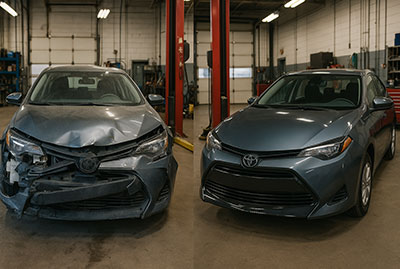
- Proof of all repairs
- Original parts receipts
- A detailed inspection to confirm it’s roadworthy
This process clears the car for use again — but the title will always be branded "rebuilt." It never goes back to “clean.”
What Does a Rebuilt Title Mean for Buyers?
A rebuilt title can be a chance to save money — but it’s not without risks. The quality of repairs matters a lot. Some are done right by pros. Others are patched up just enough to pass inspection.
Ask for:
- Before and after photos
- Repair invoices
- The inspection report
- An independent mechanic’s opinion
If the repairs were done well, a rebuilt car can serve you for years. But resale value will be lower, and insurance can be tricky. Some companies won’t offer full coverage, or they’ll charge more.
Key Point: Rebuilt vs. Salvage
⛔ A salvage title means it’s not legal to drive.
✅ A rebuilt title means it is — but it was once salvage.
This is where the keyword what does rebuilt title mean comes into play: it means the car had serious damage, was written off, then brought back to legal road use after meeting state requirements.
What Is the Difference Between a Salvage Title and a Rebuilt Title?
People often confuse salvage and rebuilt titles, but they mean very different things. Both involve damage, but only one means the car is legal to drive again.
Here’s the short version:
| Feature | Salvage Title | Rebuilt Title |
|---|---|---|
| Legal to drive? | No | Yes |
| Insurance status | Usually totaled and paid out | Was totaled, then repaired and inspected |
| Needs repairs? | Yes – may be unsafe or incomplete | No – should be roadworthy |
| Can be registered? | No, until rebuilt | Yes |
| Resale value | Very low | Low, but better than salvage |
| Requires inspection? | Not yet | Yes – to become rebuilt |
| Title branding | “Salvage” | “Rebuilt” (formerly salvage) |
- A salvage title is like a warning label — "Damaged goods. Not for use."
- A rebuilt title says — "Fixed, but once damaged. Use with care."
What’s the Risk?
Both titles mean the car once had serious issues. But a rebuilt title car should now be safe to drive. The catch is, the repairs might not be high quality. Some sellers cut corners to pass inspection and flip the car fast.
That’s why knowing what is the difference between a salvage title and a rebuilt title is key when buying used. Always ask who did the repairs, get the paperwork, and run a VIN check. If you’re unsure, walk away or get a trusted mechanic involved.
Next, let’s look at how you can tell a title’s real status — clean, salvage, or rebuilt. Want to continue?
How to Tell If a Title Is Clean or Salvage
When buying a used car, never assume the title is clean just because the car looks fine. A shiny paint job can hide a rough history. You need to check the title status yourself.
Here’s how to find out how to tell if a title is clean or salvage:
1. Check the Title Document
Ask to see the physical title. Look for words like:
- Clean – no major insurance loss.
- Salvage – declared a total loss, not road-legal.
- Rebuilt – was salvage, now repaired and inspected.
Each state uses different language. Some may say “branded,” “rebuilt salvage,” or “prior salvage.” Read carefully.
2. Run a VIN Check
The easiest way to uncover the truth is with the Vehicle Identification Number (VIN). Use:
- ProVinCheck – Paid, but detailed reports.
- NICB VINCheck – Free and shows total loss records and theft.
- Your state’s DMV – Some offer online tools or in-person checks.
A VIN check will reveal title history, past accidents, flood damage, and more.
3. Inspect the Car for Clues
If the seller won’t show the title or VIN, that’s a red flag. But also look for:
- Uneven panel gaps or mismatched paint
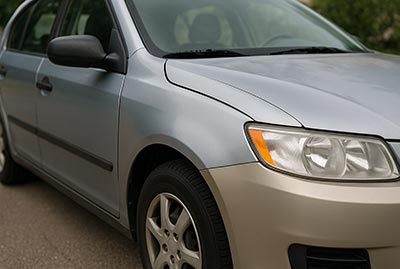
- Signs of frame repair or welding
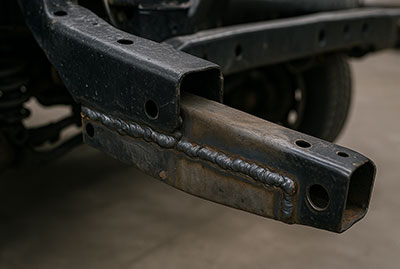
- Water stains, mold, or rust in odd spots
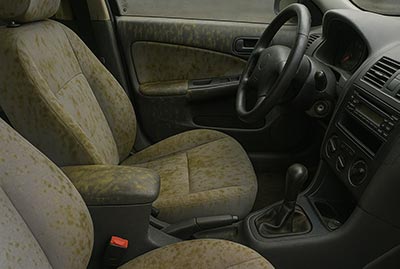
These signs don’t confirm salvage, but they suggest something worth digging into.
4. Ask for Repair and Insurance Records
If a car was ever declared salvage or rebuilt, there should be a paper trail. Ask:
- Was this car ever totaled?
- Is the title clean or rebuilt?
- Can you show me the repairs?
A trustworthy seller won’t dodge these questions.
Why This Matters
Knowing how to tell if a title is clean or salvage protects you from overpaying or buying a risky car. Title fraud exists. Some sellers “wash” salvage titles by moving them across states.
Don’t skip the title check — it’s one of the most important steps in used car shopping.
How to Get a Salvage Title Cleared
You can’t turn a salvage title into a clean one — but you can get it cleared to rebuilt. That means fixing the car, passing inspection, and getting approval from your state. It’s how a totaled car gets back on the road.
Here’s a step-by-step guide on how to get a salvage title cleared.
1. Repair the Vehicle
You’ll need to fix all damage that made the car a total loss. This usually includes:
- Structural work (frame, suspension)
- Replacing airbags
- Mechanical repairs
- Cosmetic work (paint, lights, glass)
Use original or certified parts if possible. Keep every receipt. Most states want proof of what was fixed and what parts were used.
2. Take Photos Before and After
Some states require photos showing:
- The damage before repairs
- The vehicle during the repair process
- The final condition after repairs
Even if not required, it helps your case and builds trust with future buyers.
3. Complete a Rebuilt Title Application
Once repairs are done, apply through your state DMV or motor vehicle agency. Requirements vary by state but usually include:
- The salvage title
- A completed inspection request form
- Repair receipts and parts invoices
- Vehicle photos
- Proof of ownership or bill of sale
Check your state’s DMV site for exact forms and fees.
4. Pass a Salvage Inspection
The car must pass a state inspection before it can be titled as rebuilt. This inspection checks:
- Safety systems (brakes, lights, airbags)
- Frame integrity
- VIN and title match
- No stolen parts used
You’ll usually schedule this with a state inspection station or licensed rebuilder.
5. Receive a Rebuilt Title
Once approved, the DMV will issue a rebuilt or reconditioned title. It still shows the car was once salvage — that can’t be erased — but it’s now legal to drive and register.
Important: State Laws Vary
Some states are stricter than others. For example:
- California and Florida require CHP or highway patrol inspections.
- New York demands detailed documentation and repair shop info.
- Some states won’t allow certain salvage cars back on the road at all (like flood cars).
Always check your local laws first.
Can You Get Insurance for a Rebuilt Title Car?
Yes, but it’s often limited. Many insurers only offer liability coverage. Full coverage may cost more — or be denied entirely.
Clearing a salvage title is doable — but it takes time, money, and paperwork. Do it right, and you can bring a totaled car back to life safely.
Should You Buy a Car With a Salvage or Rebuilt Title?
Buying a car with a salvage or rebuilt title can save you thousands — or cost you way more in the long run. The key is knowing what you’re getting into.
Let’s break down the pros, cons, and what to watch for.
Pros of Buying a Rebuilt Title Car
- Lower Price – Rebuilt title cars often sell for 20–40% less than clean title cars.
- Good Value If Repaired Right – If the work was done well, you can get a solid car for less.
- Hard-to-Find Models – Classic or rare cars that were salvaged may still be worth restoring.
Cons of Buying a Rebuilt or Salvage Car
- Insurance Can Be Tough – Some insurers won’t offer full coverage. Others may charge more.
- Lower Resale Value – You’ll get less when selling, even if the car runs great.
- Risk of Poor Repairs – Not all rebuilds are safe. Some are patched up just to pass inspection.
- Harder to Finance – Banks may not give loans for branded-title vehicles.
Buying a Salvage Title Car? Be Careful
You can’t legally drive a salvage title car. It’s only useful if:
- You want it for parts, or
- You’re planning to rebuild it and get it re-titled
Either way, know this takes time, money, and paperwork. You’ll need to learn how to get a salvage title cleared, as we covered earlier.
Buying a Rebuilt Title Car? Ask These Questions
Before you commit, get clear answers:
- Who did the repairs? A licensed shop or backyard job?
- Is there a full list of replaced parts?
- Are there before-and-after photos?
- Was the frame damaged?
- Has it passed state inspection?
- Can I get it checked by my mechanic?
Also, run a VIN report to see the original damage and title history.
So, Is It Worth Buying a Car With a Salvage Title?
Sometimes — but only if:
- You know what you’re doing
- The savings are big
- You verify the repairs
- You’re OK with lower resale and limited insurance
If you're unsure or the seller seems shady, walk away. There are plenty of clean title cars out there.
FAQs About Vehicle Titles
What is the difference between rebuilt, salvage, and clean titles?
- Clean Title: Indicates the vehicle has never been declared a total loss by an insurance company. It's free from significant damage history.
- Salvage Title: Assigned when a vehicle has sustained substantial damage (from accidents, floods, etc.) and is deemed a total loss. Such vehicles are not roadworthy until repaired and re-inspected.
- Rebuilt Title: Given to a previously salvaged vehicle that has been repaired and passed state inspections, making it legal for road use. However, it still carries a history of significant damage.
Is it bad if a car has a rebuilt title?
Not inherently. A rebuilt title means the car was once significantly damaged but has since been repaired and inspected. However, potential drawbacks include:
- Insurance Challenges: Some insurers may offer limited coverage or higher premiums.
- Resale Value: Typically lower than comparable vehicles with clean titles.
- Potential Hidden Issues: If repairs weren't done properly, underlying problems might persist.
Can a salvage title be changed to clean?
No. Once a vehicle has a salvage title, it cannot revert to a clean title. Even after repairs and inspections, the title will be branded as "rebuilt" or "reconstructed," indicating its history.
How can I check a car title for free?
You can use the National Insurance Crime Bureau's (NICB) VINCheck service. By entering the Vehicle Identification Number (VIN), you can access information about:
- Theft Records: Whether the vehicle has been reported stolen.
- Salvage Records: If the vehicle has been declared a total loss by an insurance company.
This service is free and provides a basic overview of a vehicle's history.
Do insurance companies cover rebuilt title cars?
Yes, but coverage varies:
- Liability Insurance: Most insurers offer this basic coverage for rebuilt title vehicles.
- Comprehensive and Collision: Some insurers may be hesitant or charge higher premiums due to the vehicle's history.
